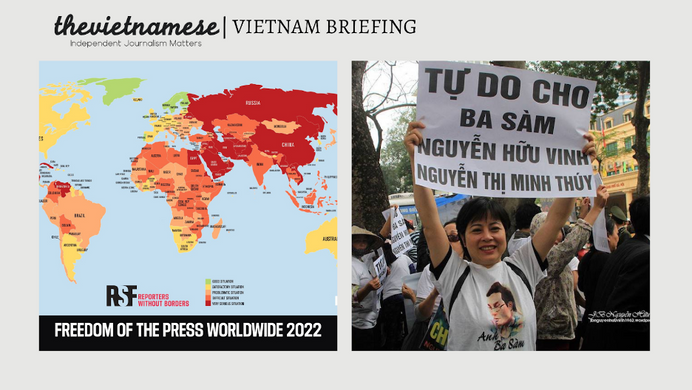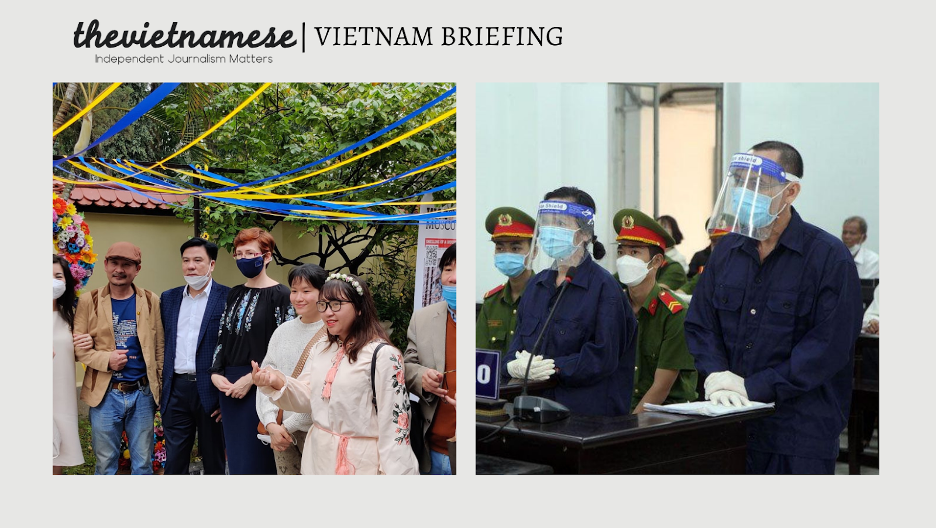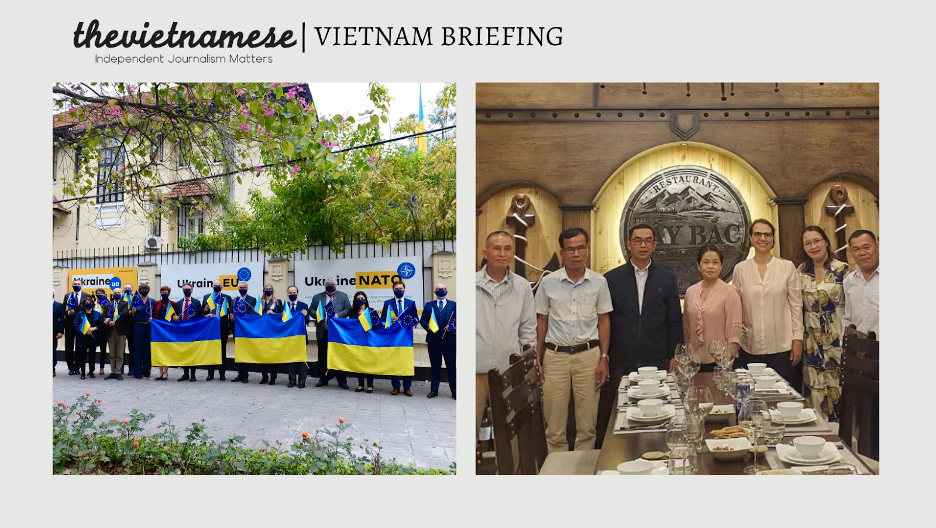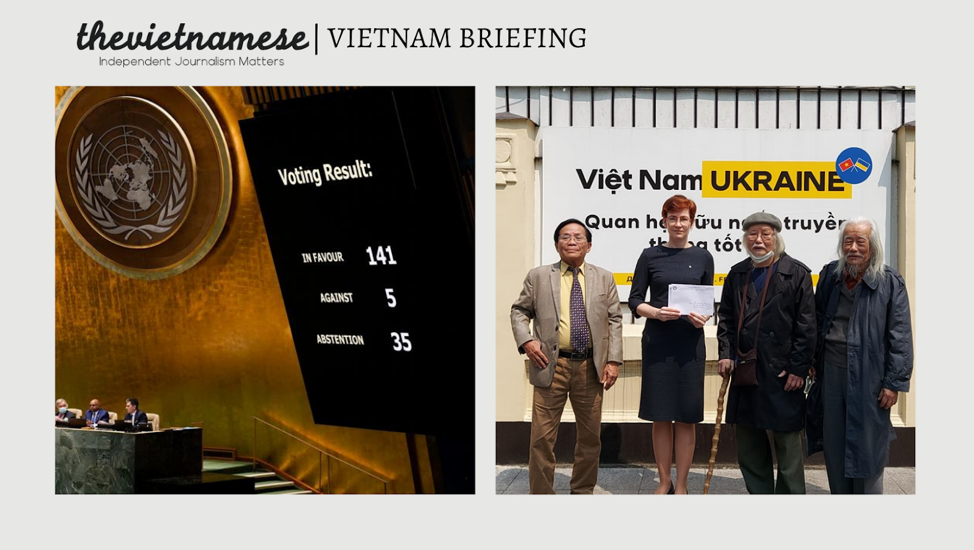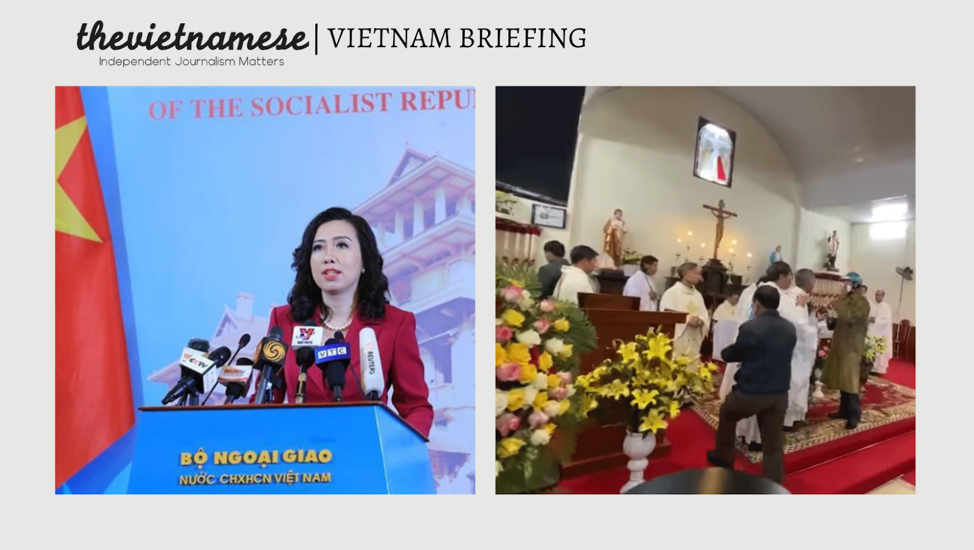The Vietnam Briefing, which is released every Monday morning Vietnam time, looks at Vietnam’s social and political developments of the past week.
Source: The Vietnamese Magazine
Vietnam ranks 174th in Reporters Without Borders’ 2022 press freedom index
- On May 3, Reporters Without Borders (RSF) released its annual ranking and evaluation of press freedom in 180 countries and territories around the world. Vietnam ranks 174th in RSF’s report this year, moving up one place from last year’s 175th position.
- According to RSF’s evaluation, the press freedom ranking is based on the assessment of each country’s performance in five different indicators, including political, economic, legislative, social, and security. Vietnam ranks 173rd, 176th, 172nd, 170th, and 170th in each category, respectively.
- In a press release following the publication of the World Press Freedom Index, RSF underscored how the increasing polarization of the media had fuelled divisions and created tensions within and between many countries at the international level. The press freedom advocate added that fake news, propaganda, and unregulated disinformation had created “disastrous effects” as well as “weakened” democracies around the world.
- There are currently 41 journalists imprisoned in Vietnam, according to RSF’s index. They include the prominent journalist Pham Doan Trang, five members of the journalistic initiative Bao Sach (Clean Newspaper,) and three journalists of the Independent Journalists Association of Vietnam (IJAVN.)
Vietnamese activist transferred to hospital for treatment of depression as her mental health deteriorates
- Nguyen Thuy Hanh, an activist popularly known for her founding of the 50K Fund, the monetary fund to assist the families of political prisoners in Vietnam, has been transferred to Central Mental Hospital No. 1 in Hanoi for depression treatment amid her worsening mental health condition, according to her husband Huynh Ngoc Chenh. Hanh was previously held in pretrial detention under investigation for “anti-State activities.”
- According to Chenh, Hanh was reportedly transferred to the mental hospital at the end of April but he only learned about her situation after he was notified by the investigation authorities on May 6. The investigation police added that her pretrial detention term was temporarily suspended and the investigation process would resume as soon as she recovers from her illness.
- Chenh also expressed concern on his Facebook that the Vietnamese authorities could use Hanh’s mental health conditions to forcibly make her stay in de facto police custody without having to bring her case to trial.
- Previously, the Vietnamese activist and blogger Le Anh Hung was also forced to receive treatment in the Central Mental Hospital despite his family saying that he had no problems with his mental health. Hung has been held in the mental hospital since 2019 and his case has never been brought to trial. There were also reports that he was subjected to abuse and mistreatment during his treatment.
- In the latest update on social media, Chenh said he was finally allowed to meet Nguyen Thuy Hanh on May 7 in the mental health facility after she was held incommunicado for 13 months. He wrote that Hanh got skinnier but still looked healthy and youthful.
- Also according to Chenh, Hanh complained about the poor conditions of her place of detention; meanwhile, the depression medications prescribed for her personally, that Chenh sent to her every four months, were replaced by the detention center’s own medicines without notifying her or her family.
Vietnamese Facebook user sentenced to eight years in prison for “distributing anti-State materials”
- Vietnam’s State media on May 5 reported that a Vietnamese court in Tien Giang Province has sentenced Tran Hoang Huan, a local Facebook user, to eight years imprisonment and three years probation on charges of “making, storing, or distributing anti-State information and materials” under Article 117 of Vietnam’s Penal Code.
- Huan’s indictment states that in the period between September 2020 and April 2021, he regularly accessed webpages having “poisonous and reactionary” content as well as foreign news channels that had a “hostile and defiant” attitude towards the Vietnamese government.
- Consequently, Huan used the information obtained from these channels to write and publish a total of 186 posts on his personal Facebook account in order to “distort, slander and defame the Party and State leaders” as well as “attack and insult the regime and deny the revolutionary achievements.”
- In 2020, Huan was fined 12,5 million dong by the Tien Giang provincial authorities for “providing false information which distorts and defames the dignity of individuals and organizations.” He had previously received police summonses in 2016 and 2017 under the same charges.
Vietnam arrests high profile business leaders amid the government’s intensifying crackdowns on corruption
- Vietnam’s Ministry of Public Security on April 29 issued an arrest warrant and conducted a house search for Nguyen Thi Thanh Nhan, a businesswoman and the director of Advanced International Joint Stock Company (AIC), for her alleged involvement in corruption related to the construction of a hospital in Dong Nai Province.
- It was reported that she had traveled to Japan on a business trip since February last year and still has not returned to Vietnam.
- However, according to an exclusive report published by the Israeli newspaper Haaretz on May 1, Nhan is also known for her role as a key middlewoman in promoting and facilitating Vietnam-Israel arms deals over the past decade. Haaretz wrote that the primary reason behind Nhan’s prosecution was to crack down on rampant corruption in arms purchases between Vietnam’s Ministry of Defense and Israel’s security exporters.
- Russia has traditionally been one of Vietnam’s main arms suppliers. But Hanoi in recent years has sought to diversify and modernize its military weaponry amid Beijing’s intensifying aggression in the South China Sea, and most recently due to Western sanctions against Moscow as a result of its invasion of Ukraine.
- Hanoi’s latest crackdown on the country’s top business leaders, including the arrests of billionaire Trinh Van Quyet and property developer, Do Anh Dung, earlier this year, signaled the expansion of the Communist Party’s anti-corruption campaign against government bureaucrats, including high profile corporate leaders.
- According to several analysts and entrepreneurs, the turmoil in Vietnam’s economy due to the COVID-19 pandemic is pushing the government to tackle corruption in an effort to speed up economic recovery. The World Bank said in a report that problems such as declining incomes, job losses, and inequalities, among other things, are cautionary signs for the Vietnamese government as the country faces a much more challenging phase of COVID-19 ahead.
Vietnam protests as China declares annual South China Sea fishing ban
RFA:
- Hanoi has recently spoken up against China’s announcement of a unilateral fishing moratorium in the South China Sea, which began on May 1, and covers the waters north of 12 degrees north latitude in the South China Sea. Both Vietnam and the Philippines claim this area as their “traditional fishing grounds.”
- According to the spokesperson for Vietnam’s Foreign Ministry, Le Thi Thu Hang, Beijing’s imposed three-and-a-half-month fishing ban is “a violation of Vietnam’s sovereignty and territorial jurisdiction.” The moratorium applies to part of the Gulf of Tonkin and the Paracel Islands, both claimed by China and Vietnam.
- “Vietnam requests China to respect Vietnam’s sovereignty over the Paracel Islands and sovereign rights and jurisdiction over its maritime zones when taking measures to conserve biological resources in the East Sea (South China Sea), without complicating peace, stability, and order in the East Sea,” Hang added.
Vietnam and Japan agree to boost trade and security ties
- Japan and Vietnam agreed on Sunday to boost economic and security ties while calling for an end to the war in Ukraine, Japanese Prime Minister Fumio Kishida said during a Southeast Asia tour.
- Chinh said the two “agreed to boost cooperation in post-pandemic trade, strengthen supply chains and energy transition, in accordance with mutual interests.” Japan is Vietnam’s largest provider of official development aid and third-largest source of foreign direct investment. Bilateral trade rose 8.4 percent last year to $42.9 billion, according to Vietnam’s customs data.
- Kishida and Chinh said they discussed regional responses to Russia’s invasion of Ukraine and disputes in the South China Sea, where China, the Philippines, Vietnam, Taiwan, Malaysia, and Brunei have competing territorial claims. Chinh also announced Vietnam’s donation of $500,000 in humanitarian aid to Ukraine via international organizations.
Vietnam Insight: Learn more about Vietnam
Vietnam and the new Pacific Trade Triangle
East Asia Forum/ Tran Van Tho/ May 6
“This trade pattern resembles a new Pacific Trade Triangle comprised of China, South Korea, and the United States, with Vietnam as the focal point. The trade triangle of the 1980s featured industrializing Asian economies such as South Korea and Taiwan, who imported intermediate and capital goods from Japan and exported final consumer goods to the United States.
This led to large trade deficits with the former and surpluses with the latter, resulting in a trade conflict with the United States. Newly industrializing economies in Asia solved this problem by substituting imports from Japan for upgrades in their own industrial structures.
The current Pacific Trade Triangle in which Vietnam is enmeshed is riskier. On the one hand, the United States may impose protectionist measures on trading partners with which it has large deficits. On the other hand, over-reliance on imports from China may bring about instability when changes in Chinese domestic policy affect trade with neighboring countries.”
The Russia-Ukraine War: Unpacking Online Pro-Russia Narratives in Vietnam
ISEAS – Yusof Ishak Institute/ Hoang Thi Ha, Dien Nguyen An Luong/ April 27
“The ongoing Russia-Ukraine war following Moscow’s invasion on 24 February has sparked intense public debates on Vietnam’s social media. For Vietnam, the ramifications of the war are felt beyond the economic and diplomatic realms. It has become an online hotbed of conflicting and confounding narratives that demonstrate different worldviews and political leanings among Vietnamese netizens. Of note, those who support Russia and Putin have been as energized and engaged as those who are against the war and sympathetic towards Ukraine.”
Vietnam unleashes the taxman on dissent
Asia Times/ David Hutt/ May 4
“Now ‘tax evasion’ is being added to the repressive mix. There is an ‘emerging and disturbing pattern in the use of Vietnam’s tax laws to criminalize environmental leaders, and follows the broader targeting of civil society leaders, as well as shrinking civil society space,’ said the International Federation for Human Rights and the Vietnam Committee on Human Rights in a recent report.”
Vietnam’s cable car craze is driving environmental decline
Southeast Asia Globe/ Govi Snell/ May 2
“But the cable-car craze represents something bigger than the sum of the concrete pillars, steel, cables, and glass. The rapid development showcases how giant conglomerates are carving out space on Vietnam’s coasts and mountains for resorts and tourism complexes that some argue negatively impact the environment and have little benefit for local communities.
Cable cars are often key features of these projects and enable thousands of people daily to visit some of the country’s most environmentally tenuous locales. Land is often cleared for construction and the high volume of tourists shuttled to now easily accessible destinations leads to waste buildup, putting pressure on the ecosystem.”
